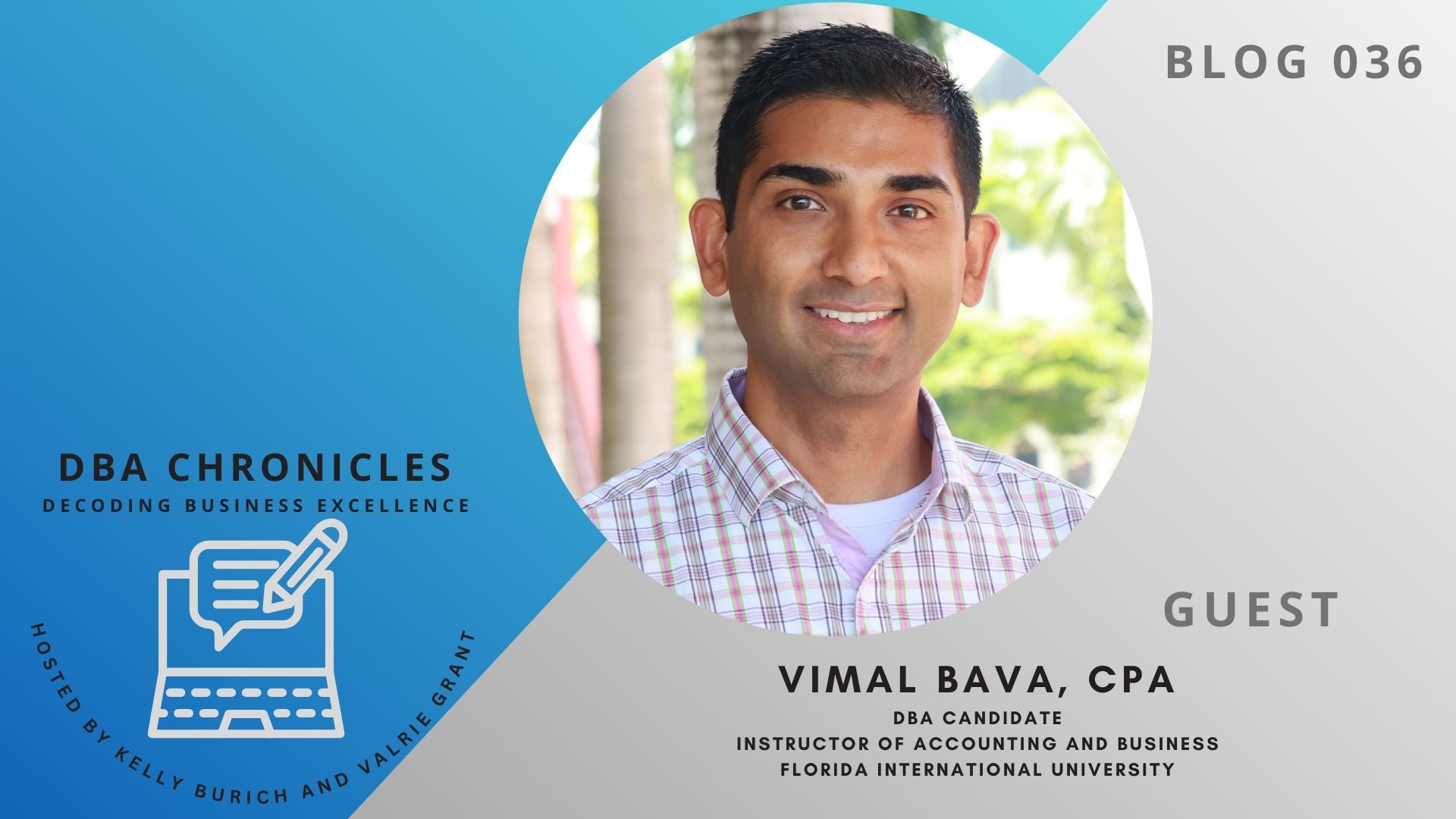More Than Survival: Reclaiming Purpose and Resilience on the DBA Journey

Guest Blogger: Vimal Bava, CPA
DBA Candidate, Florida International University
Instructor, Accounting and Business
It was 11:48 p.m. on a Thursday when I finally shut my laptop. My eyes burned, my mind was fogged, and I’d just spent hours lost in a literature review rabbit hole, one citation leading to another, none of them connecting neatly to my research question. My downloads folder was cluttered with half-read PDFs. Notes were scattered across too many apps. A cup of coffee sat beside me, long and cold; I couldn’t even remember making it. Work deadlines were closing in, I hadn’t had real time with my family all week, and somewhere in the noise, I’d misplaced the very reason I started my DBA journey.
In that moment, somewhere between fatigue and frustration, I remembered one of the messages from The Monk Who Sold His Ferrari. It wasn’t about wealth or success. It was about chasing something meaningful and losing yourself in the process.
That night, I realized something important: surviving the DBA journey wasn’t enough. I wanted to feel whole in the process. I didn’t want to trade my health, relationships, or peace of mind for a degree, no matter how prestigious. And I suspect I’m not the only one who experiences this.
The Hidden Weight of the Practitioner-Scholar
Many of us enter our DBA programs not because we need another credential, but because we feel called to do something more meaningful. We’re founders, executives, leaders, and educators. Most importantly, we’re lifelong learners chasing impact, not just titles. However, we all know this path is demanding.
We hold leadership roles by day and academic deadlines by night. We attend Zoom classes after long workdays, write research papers between client meetings, and prepare article summaries and presentations whenever we can. We parent, partner, and perform, all at once. The schedule doesn’t let up. And the guilt of not doing “enough” in every role becomes its own burden.
It’s easy to think, “Once this semester is over, I’ll catch up on sleep.” Or “Once I finish my proposal, I’ll take care of myself.” But burnout doesn’t wait for our timelines. And the research backs this up: even highly motivated adult learners experience cognitive fatigue and emotional exhaustion when balance is ignored.
Reframing Self-Care as Strategic Capacity
So, here’s the shift: what if we stop thinking of rest and resilience as indulgences, and start treating them like strategic tools?
Our ability to lead, create, write, and teach is directly tied to our mental clarity, emotional regulation, and physical energy. As practitioner-scholars, we’re not just absorbing knowledge; we’re expected to synthesize, apply, and challenge it. That’s heavy cognitive lifting. It requires a steady foundation.
When we’re depleted, we make reactive decisions. We miss nuance in our research. We forget important client details. We default to survival mode instead of innovation.
But when we’re well rested, nourished, and present, we think bigger. We connect ideas across disciplines. We lead better conversations. We see patterns others miss. This isn’t luxury. It’s leverage.
Practical Micro-Habits for the Overcommitted Brain
You don’t need to escape to a mountain monastery to reclaim your peace (though it sounds tempting). Small, repeatable practices can rebuild your resilience day by day.
- Batch your breaks like your client work: Block off 10-minute breathers between tasks. Your mind needs reset points just like your inbox.
- Rebuild rituals: A slow morning coffee. A five-minute stretch between calls. A real lunch.
- Create a “reset protocol”: Know your signs of burnout, and have a plan, whether it’s a walk, journaling, or calling a friend.
- Unplug to refuel: Schedule a tech-free hour each evening. Your brain needs boredom to spark creativity.
None of these requires overhauling your life. But practiced consistently, they’ll shift your baseline.
Rediscovering Your “Why”
Every fellow DBA student I’ve met has a reason they’re here. Some want to teach, others want to publish, and some want to prove something to themselves or use their research to change an industry. These aren’t small dreams.
But when we’re caught in the daily grind, it’s easy to forget our “why.” Take time to reconnect with it. Write it down. Say it out loud. Share it with a peer. When you know what you’re fighting for, it’s easier to set boundaries, say no, and protect your energy.
And when you lose sight of it, because you will, at times, return to it gently. You’re allowed to pause and reset.
Resilience Is a Research Tool
Remember, this journey isn’t just academic, it’s personal. It will stretch you, challenge you, and at times, wear you down. But it also has the power to shape you into a clearer, stronger version of yourself, if you let it.
So, here’s your challenge: What’s one micro habit you can commit to this week? A full lunch. A work curfew. A ten-minute walk. Something small, but sacred. Investing in your well-being isn’t selfish. It is the most strategic thing you can do for your research, your work, and your life. You don’t have to just survive this journey. You can grow through it!
What's your one micro-habit this week?
Vimal Bava is a CPA, instructor of accounting and business, and a DBA candidate at Florida International University. His research explores the human side of technology in the workplace, with a focus on burnout, emotional intelligence, and what it means to lead with both strategy and soul.

